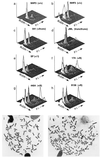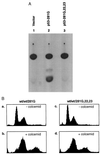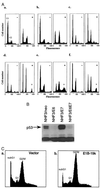An oncogenic form of p53 confers a dominant, gain-of-function phenotype that disrupts spindle checkpoint control
- PMID: 9560247
- PMCID: PMC20232
- DOI: 10.1073/pnas.95.9.5166
An oncogenic form of p53 confers a dominant, gain-of-function phenotype that disrupts spindle checkpoint control
Abstract
Although it is well-established that p53 functions as a tumor suppressor gene, certain mutations exhibit gain-of-function activities that increase oncogenic transformation. We have found a common class of p53 missense mutation that exhibits a dominant, gain-of-function activity that generates genomic instability. Fibroblasts from Li-Fraumeni syndrome heterozygotes with such mutations generate polyploid cells when exposed to spindle depolymerizing agents. Expression of such mutant alleles in normal fibroblasts yields the same phenotype. This class of dominant, gain-of-function p53 mutation (p53(RSC), relaxed spindle checkpoint allele) does not require the transcriptional activation function of p53 for this behavior. Thus p53 mutations can contribute to progression of a cancer cell not only by absence of p53 tumor suppressor activity but also by the presence of an activity that promotes genetic instability.
Figures




Similar articles
-
Analysis of genomic instability in Li-Fraumeni fibroblasts with germline p53 mutations.Oncogene. 1996 Jun 6;12(11):2267-78. Oncogene. 1996. PMID: 8649766 Free PMC article.
-
Dissociation between cell cycle arrest and apoptosis can occur in Li-Fraumeni cells heterozygous for p53 gene mutations.Oncogene. 1997 May 8;14(18):2137-47. doi: 10.1038/sj.onc.1201050. Oncogene. 1997. PMID: 9174049
-
p53 does not control the spindle assembly cell cycle checkpoint but mediates G1 arrest in response to disruption of microtubule system.Cell Biol Int. 1999;23(5):323-34. doi: 10.1006/cbir.1999.0362. Cell Biol Int. 1999. PMID: 10579898
-
Gain of function properties of mutant p53 proteins at the mitotic spindle cell cycle checkpoint.Histol Histopathol. 2000 Apr;15(2):551-6. doi: 10.14670/HH-15.551. Histol Histopathol. 2000. PMID: 10809376 Review.
-
The Li-Fraumeni syndrome: an inherited susceptibility to cancer.Mol Med Today. 1997 Sep;3(9):390-5. doi: 10.1016/S1357-4310(97)01105-2. Mol Med Today. 1997. PMID: 9302689 Review.
Cited by
-
Cell fate regulation governed by p53: Friends or reversible foes in cancer therapy.Cancer Commun (Lond). 2024 Mar;44(3):297-360. doi: 10.1002/cac2.12520. Epub 2024 Feb 4. Cancer Commun (Lond). 2024. PMID: 38311377 Free PMC article. Review.
-
Akt1/PKB upregulation leads to vascular smooth muscle cell hypertrophy and polyploidization.J Clin Invest. 2000 Oct;106(8):1011-20. doi: 10.1172/JCI8252. J Clin Invest. 2000. PMID: 11032861 Free PMC article.
-
Altered centrosome structure is associated with abnormal mitoses in human breast tumors.Am J Pathol. 1999 Dec;155(6):1941-51. doi: 10.1016/S0002-9440(10)65513-7. Am J Pathol. 1999. PMID: 10595924 Free PMC article.
-
The execution of the transcriptional axis mutant p53, E2F1 and ID4 promotes tumor neo-angiogenesis.Nat Struct Mol Biol. 2009 Oct;16(10):1086-93. doi: 10.1038/nsmb.1669. Epub 2009 Sep 27. Nat Struct Mol Biol. 2009. PMID: 19783986
-
A Protein in the Yeast Saccharomyces cerevisiae Presents DNA Binding Homology to the p53 Checkpoint Protein and Tumor Suppressor.Biomolecules. 2020 Mar 7;10(3):417. doi: 10.3390/biom10030417. Biomolecules. 2020. PMID: 32156076 Free PMC article.
References
-
- Hollstein M, Sidransky D, Vogelstein B, Harris C C. Science. 1991;253:49–53. - PubMed
-
- Lane D P, Benchimol S. Genes Dev. 1990;4:1–8. - PubMed
-
- Hann B C, Lane D P. Nat Genet. 1995;9:221–222. - PubMed
-
- Donehower L A, Harvey M, Slagle B L, McArthur M J, Montgomery C A, Jr, Butel J S, Bradley A. Nature (London) 1992;356:215–221. - PubMed
-
- Jacks T, Remington L, Williams B O, Schmitt E M, Halachmi S, Bronson R T, Weinberg R A. Curr Biol. 1994;4:1–7. - PubMed
Publication types
MeSH terms
Substances
Grants and funding
LinkOut - more resources
Full Text Sources
Other Literature Sources
Research Materials
Miscellaneous

